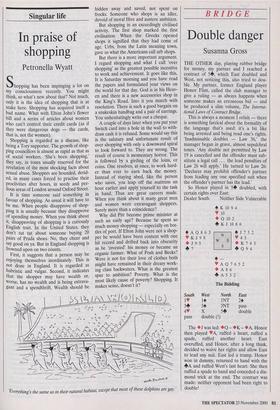Singular life
In praise of shopping
Petronella Wyatt
Shopping has been impinging a lot on my consciousness recently. You might think, so what's new about that? Not much, only it is the idea of shopping that is at stake here. Shopping has acquired itself a bad name. What with Elton John's flower bill and a series of articles about women who can't control their credit cards (as if they were dangerous dogs — the cards, that is, not the women).
Shopping is regarded as a disease, like being a Tory supporter. The growth of shop- ping councillors is almost as rapid as that as of social workers. 'She's been shopping,' they say, in tones usually reserved for the revelation of the most shocking facts about sexual abuse. Shoppers are hounded, derid- ed, in many cases forced to practise their proclivities after hours, in seedy and per- ilous areas of London around Oxford Street.
It is time someone said something in favour of shopping. As usual it will have to be me. When people disapprove of shop- ping it is usually because they disapprove of spending money. When you think about it, disapproving of shopping is a curiously English trait. In the United States, they don't tut tut about someone buying 20 pairs of Prada shoes. No, they cheer and say good on ya. But in England shopping is frowned upon on two counts.
First, it suggests that a person may be enjoying themselves inordinately. This is not done in England. It is regarded as hubristic and vulgar. Second, it indicates that the shopper may have wealth or, worse, has no wealth and is being extrava- gant and a spendthrift. Wealth should be hidden away and saved, not spent on frocks. Someone who shops is an idler, devoid of moral fibre and austere ambition.
But shopping in an exceedingly civilised activity. The first shop marked the first civilisation. When the Greeks opened shops it signified that they had come of age. Urbs, from the Latin meaning town, gave us what the Americans call urb shops.
But there is a more important argument. I regard shopping and what I call 'over shopping' as the greatest possible incentive to work and achievement. It goes like this. It is Saturday morning and you have read the papers and formulated your views on the world for that day. God is in his Heav- en and there is a new accessories shop in the King's Road. Into it you march with resolution. There is such a good bargain on a snakeskin handbag and a pair of earrings. You unhesitatingly write out a cheque.
A couple of days later when you put your Switch card into a hole in the wall to with- draw cash it is refused. Some would say this is the salutary and unfortunate result of over shopping with only a downward spiral to look forward to. They are wrong. The result of course is momentary horror. This is followed by a girding of the loins, or coins. One resolves, at once, to work hard- er- than ever to earn back the money. Instead of staying abed, like the person who saves, you leap off the mattress an hour earlier and apply yourself to the task in hand. Thus are great careers made. When you think about it many great men and women were extravagant shoppers. Surely more than a coincidence?
Why did Pitt become prime minister at such an early age? Because he spent so much money shopping — especially on bot- tles of port. If Elton John were not a shop- per he would have been content with one hit record and drifted back into obscurity as he 'invested' his money or became an organic farmer. What of Posh and Becks? Were it not for their love of clothes both might have remained in their dreary work- ing class backwaters. What is the greatest spur to ambition? Poverty. What is the most likely cause of poverty? Shopping. It makes sense, doesn't it?
Everything's the same as in their natural habitat, except that most of these dolphins are gay.'





























































































 Previous page
Previous page